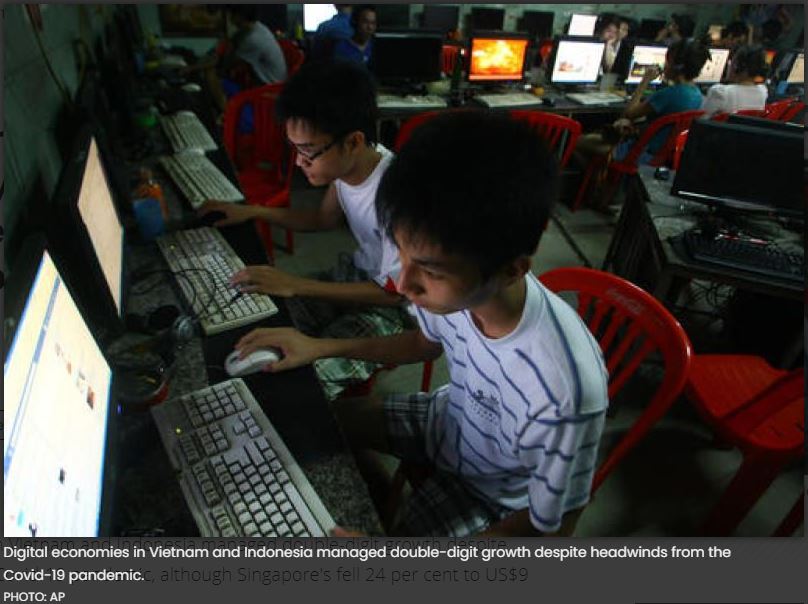Singapore’s Internet economy drops 24% in 2020; Vietnam, Indonesia see double-digit growth
DIGITAL economies in Vietnam and Indonesia managed double-digit growth despite headwinds from the Covid-19 pandemic, although Singapore’s fell 24 per cent to US$9 billion.
According to the 2020 South-east Asia e-Conomy report by Google, Temasek and Bain & Co, Vietnam’s Internet economy grew 16 per cent to reach US$14 billion in gross merchandise value (GMV), while Indonesia’s grew 11 per cent to reach US$44 billion.
However, Singapore’s Internet economy fell about 24 per cent to US$9 billion, from US$12 billion in 2019. This comes on the back of a 70 per cent drop in the city-state’s online travel vertical from a year before, which accounted for almost half of its GMV.
Other sectors in Singapore’s Internet economy (excluding travel) grew about 20 per cent on average from last year, mostly driven by an 87 per cent spike from businesses in the e-commerce industry.
According to the report, Singapore will remain a “regional enabler for growth”, despite the short-term GMV decline since it is the regional headquarters for multiple unicorns.
The Republic houses the highest number of headquarters for unicorns among South-east Asia, including Lazada and Sea Ltd. This has helped establish Singapore as a regional hub for multiple sectors such as fintech, and build a “strong startup ecosystem”, said the report.
Singapore recorded 325 deals in the first half of 2020, with a total deal value of US$2.5 billion.
The city-state’s Internet economy is expected to hit US$22 billion in 2025; while Indonesia’s digital economy is expected reach US$124 billion, growing by 23 per cent. The Philippines is expected to have the highest CAGR at 30 per cent, hitting US$28 billion by 2025.
All across South-east Asia, consumers, as well as small and medium enterprises, are adopting digital financial services “like never before”, said the report.
About 40 million more people in the region have joined the Internet this year amid physical disruptions during the pandemic, compared to 100 million over the four years prior. This pushes the total number online – which was only at about 260 million five years ago – to 400 million, or 70 per cent of the region’s population.
Consumers today have been spending more time online since lockdowns started, with the average time spent online for personal use each day standing at 4.7 hours, at least an hour more each day compared to before.
With a growing online population, strong fundamentals, greater online supply and a supportive ecosystem, the overall long-term outlook is now more robust than ever, said the report. Many users have started moving online for food delivery, groceries, education and entertainment, and 94 per cent of these new users are unlikely to revert.
However, challenges remain. Talent continues to be a critical impediment to growth for the Internet economy, said the report, which may be held back due to shortage of workers with the right skills.
“There is an urgent need and opportunity to reskill and upskill workers so that they can find jobs in the growing Internet sectors amid the tough employment climate.”
Other factors which could be potential stumbling blocks – Internet access, consumer trust, funding, payments and logistics – have made significant progress from the year before, said the report.
Source: https://www.businesstimes.com.sg/garage/singapores-internet-economy-drops-24-in-2020-vietnam-indonesia-see-double-digit-growth


 English
English




